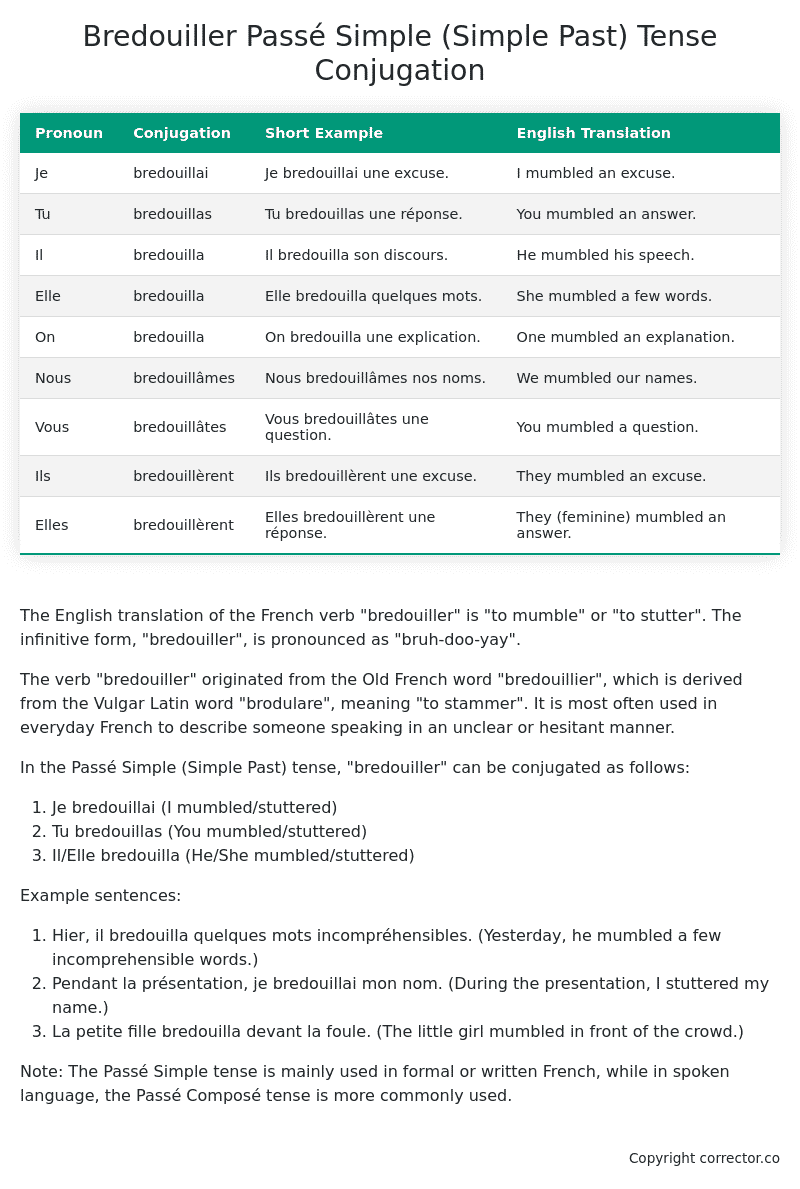Passé Simple (Simple Past) Tense Conjugation of the French Verb bredouiller
Introduction to the verb bredouiller
The English translation of the French verb “bredouiller” is “to mumble” or “to stutter”. The infinitive form, “bredouiller”, is pronounced as “bruh-doo-yay”.
The verb “bredouiller” originated from the Old French word “bredouillier”, which is derived from the Vulgar Latin word “brodulare”, meaning “to stammer”. It is most often used in everyday French to describe someone speaking in an unclear or hesitant manner.
In the Passé Simple (Simple Past) tense, “bredouiller” can be conjugated as follows:
- Je bredouillai (I mumbled/stuttered)
- Tu bredouillas (You mumbled/stuttered)
- Il/Elle bredouilla (He/She mumbled/stuttered)
Example sentences:
- Hier, il bredouilla quelques mots incompréhensibles. (Yesterday, he mumbled a few incomprehensible words.)
- Pendant la présentation, je bredouillai mon nom. (During the presentation, I stuttered my name.)
- La petite fille bredouilla devant la foule. (The little girl mumbled in front of the crowd.)
Note: The Passé Simple tense is mainly used in formal or written French, while in spoken language, the Passé Composé tense is more commonly used.
Table of the Passé Simple (Simple Past) Tense Conjugation of bredouiller
| Pronoun | Conjugation | Short Example | English Translation |
|---|---|---|---|
| Je | bredouillai | Je bredouillai une excuse. | I mumbled an excuse. |
| Tu | bredouillas | Tu bredouillas une réponse. | You mumbled an answer. |
| Il | bredouilla | Il bredouilla son discours. | He mumbled his speech. |
| Elle | bredouilla | Elle bredouilla quelques mots. | She mumbled a few words. |
| On | bredouilla | On bredouilla une explication. | One mumbled an explanation. |
| Nous | bredouillâmes | Nous bredouillâmes nos noms. | We mumbled our names. |
| Vous | bredouillâtes | Vous bredouillâtes une question. | You mumbled a question. |
| Ils | bredouillèrent | Ils bredouillèrent une excuse. | They mumbled an excuse. |
| Elles | bredouillèrent | Elles bredouillèrent une réponse. | They (feminine) mumbled an answer. |
Other Conjugations for Bredouiller.
Le Present (Present Tense) Conjugation of the French Verb bredouiller
Imparfait (Imperfect) Tense Conjugation of the French Verb bredouiller
Passé Simple (Simple Past) Tense Conjugation of the French Verb bredouiller (You’re reading it right now!)
Passé Composé (Present Perfect) Tense Conjugation of the French Verb bredouiller
Futur Simple (Simple Future) Tense Conjugation of the French Verb bredouiller
Futur Proche (Near Future) Tense Conjugation of the French Verb bredouiller
Plus-que-parfait (Pluperfect) Tense Conjugation of the French Verb bredouiller
Passé Antérieur (Past Anterior) Tense Conjugation of the French Verb bredouiller
Futur Antérieur (Future Anterior) Tense Conjugation of the French Verb bredouiller
Subjonctif Présent (Subjunctive Present) Tense Conjugation of the French Verb bredouiller
Subjonctif Passé (Subjunctive Past) Tense Conjugation of the French Verb bredouiller
Subjonctif Imparfait (Subjunctive Imperfect) Tense Conjugation of the French Verb bredouiller
Conditionnel Présent (Conditional Present) Tense Conjugation of the French Verb bredouiller
Conditionnel Passé (Conditional Past) Tense Conjugation of the French Verb bredouiller
Conditionnel Passé II (Conditional Past II) Tense Conjugation of the French Verb bredouiller
L’impératif Présent (Imperative Present) Tense Conjugation of the French Verb bredouiller
L’impératif Passé (Imperative Past) Tense Conjugation of the French Verb bredouiller
L’infinitif Présent (Infinitive Present) Tense Conjugation of the French Verb bredouiller
L’infinitif Passé (Infinitive Past) Tense Conjugation of the French Verb bredouiller
Le Participe Présent (Present Participle) Tense Conjugation of the French Verb bredouiller
Le Participe Passé (Past Participle) Tense Conjugation of the French Verb bredouiller
Struggling with French verbs or the language in general? Why not use our free French Grammar Checker – no registration required!
Get a FREE Download Study Sheet of this Conjugation 🔥
Simply right click the image below, click “save image” and get your free reference for the bredouiller Passé Simple tense conjugation!

Bredouiller – About the French Passé Simple (Simple Past) Tense
Formation
Usage
Narration
Historical Context
Interactions with other tenses
Passé Composé
Imparfait
Conditional and Subjunctive
Summary
I hope you enjoyed this article on the verb bredouiller. Still in a learning mood? Check out another TOTALLY random French verb conjugation!


